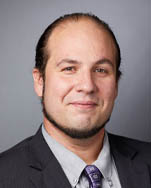Philip Barello

FLY: How did you begin your career?
I studied and practiced informally and formally. I made systems of reused electronics to record original music before learning to write code and manage technology. Writing code and music are similar, as you can imagine a goal and then practice prerequisite techniques independently, and eventually combine them as designed. I found common grooves among the processes of recording music (acquiring and storing data), editing, mixing, and mastering recordings until they feel right (preprocessing, processing, and postprocessing data), making reusable copies (backup your data in multiple locations and formats, and have a working player to make a great collection better), and sharing copies in ways others can access and respond (physical media like vinyl, tape, and disc, and digitization for web, mobile, and social media).
At first, I worked on a global environmental health and safety system in New York, then telecom and network and security infrastructure in California, and a few enterprise mainframes, servers, and workstations, around the world before coming to Yale.
FLY: Tell me about your current role at Yale University:
I manage IT for Yale School of Medicine Department of Neuroscience. We have a mix of original and licensed systems, applications, and data spanning single-board computers to high-performance and cloud computing. One of my projects involves telepathology, in which we are digitizing microscope slides of brain tissue to make them web-and-mobile-accessible.
FLY: What skills, abilities, and personal attributes are essential to success in your job?
Active listening, collaborative problem solving, and continual learning and improvement.
FLY: What non-work-related aspect have you enjoyed most about the Yale community?
I’m fascinated with the Libraries and Museums, particularly the Cushing Brain Center and the Collection of Musical Instruments.
FLY: What drew you to FLY and how have you spent your time in the group?
There are many groups available to focus on who we are. FLY enables us to focus on who we will become. I’ve been involved with the FLY Professional Development subcommittee since 2014, currently as Co-Chair. Some of my favorite moments, aside from planning and attending some wonderful events with friends, have been in our collaborations with other affinity groups at Yale and also our Book Club discussions.
FLY: What changes have been made to your work since COVID-19 started to impact Yale?
Working remotely as needed for years, this transition was fortunately not too difficult for me. I’ve had bandwidth to simplify the transition for others. In-person classes and seminars were reimagined as virtual events, and some improvisation was required. Despite the many challenges we’re facing, in some ways we can be more connected than ever before. I believe we can and should continue extending access to trustworthy systems and information to more people indefinitely.